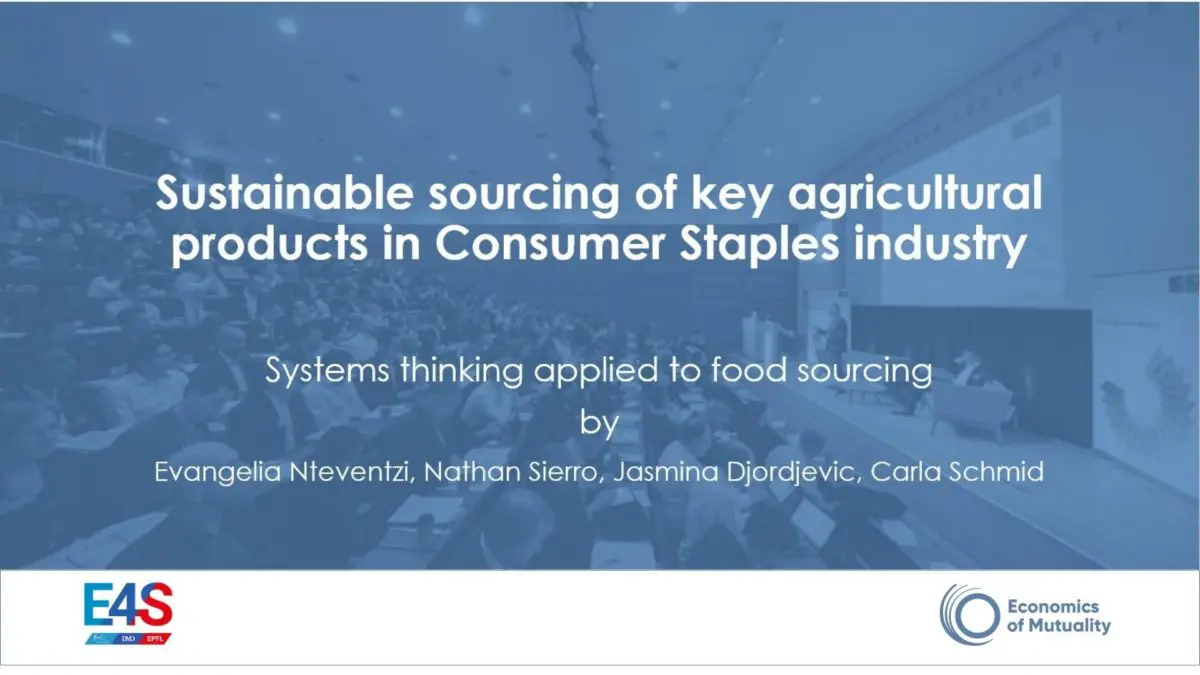TRANSFORMATIVE PROJECTS


Sustainable Sourcing of Key Agricultural Products in the Consumer Staples Industry
Partner Organization: Economics of Mutuality (EOM)
In a world in need of urgent action, the Mutual Value Initiative (MVI) by Economics of Mutuality (EoM) offers an alternative pathway to amplify positive impact on society and planet through responsible business management.
The MVI methodology pursues an innovative systems-thinking approach that enables the comprehensive understanding of industry challenges from a multi-stakeholder perspective and the identification of concrete impact metrics allowing businesses to track progress across non-financial areas of interest affecting stakeholders.
The transformative research project conducted by E4S students implements the MVI methodology on the challenge of “Sustainable sourcing of key agricultural products” focused on social and environmental factors, which was highlighted as one of the most voiced challenges in the Consumer Staples industry across stakeholders.
Agriculture, as the world’s largest industry, accounting for 31% of global employment and 38% of global land surface use, has a decisive role to play in propelling the sustainability paradigm. Despite the positive effects of 1.3 trillion dollars’ worth of food production annually on global hunger and economic prosperity, agriculture is also responsible for 4 out of 5 planetary boundaries being at high risk and 20-30% of greenhouse gas emissions. Moreover, in developing countries, agricultural workers and their families tend to experience extreme poverty, while severe human rights violations, such as forced labour and child labour are reported across the supply chain. Although public sector’s organizations such as the Food and Agricultural Organization of the United Nations (FAO) and the International Labour Organization (ILO) have been working with private enterprises on relevant initiatives, environmental and social issues associated with agriculture continue to persist over time.
Through the course of the project, five key problem areas were identified using the MVI framework, namely:
- the dominance of monoculture
- the amplification of livestock agriculture
- the income insecurity of farmers
- the gender disparity in access to opportunities
- consumer purchasing behaviour
By delving deeper into the dynamics of the stakeholder ecosystem underpinning these problems, key levers and feedback loops were analyzed to form the basis for designing more coordinated courses of action.
As a preview of the results, the following recommendations are proposed for the main stakeholders of the system:
- Farmers: accelerate the transition to more natural agricultural practices that consolidate the soil equilibrium.
- International organizations: facilitate programs for farming communities focused on sustainable agricultural practices, gender equality and diversification of income streams.
- Government: support farmers through subsidy schemes and accessible educational opportunities. Reform legislation to secure land ownership rights and mitigate gender discrimination. Regulate livestock production and assign financial value to natural capital. Invest in emerging technologies and public infrastructure that help strengthen agricultural systems and the wider economy.
- Finance: increase farmers’ resilience through micro-loans, financial training of farming communities and adapted insurance schemes that incorporate climate risks to agricultural production. Use transition funds to further propel the sustainability transition of agricultural systems in a way that does not leave farmers behind.
- Food, Beverage & tobacco industries: implement clear sourcing standards and multi-stakeholder partnerships across the agricultural supply chain. Establish procurement security for farmers, especially female farmers.
- Food & staples retailing: promote sustainably sourced products in stores through adjusted pricing, behavioural nudges and intentional marketing to encourage a shift in consumer purchasing behaviour.
When implemented collectively and by multiple stakeholders in the ecosystem, targeted interventions, whose impact is quantified by corresponding metrics, demonstrate ways to unlock inertia and improve the resilience of agricultural systems – creating the shared and sustainable prosperity that E4S and EoM envision.
Students: Evangelia Nteventzi, Nathan Sierro, Jasmina Djordjevic, Carla Schmid
Company’s supervisors: Morta Kazlauskaitė, Lucie Keller, Alastair Colin-Jones, Nadia Terfous
Academic supervisors: Jean-Philippe Bonardi, Samuel Wicki
Transformative Projects’ Lead: Samuel Wicki